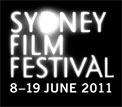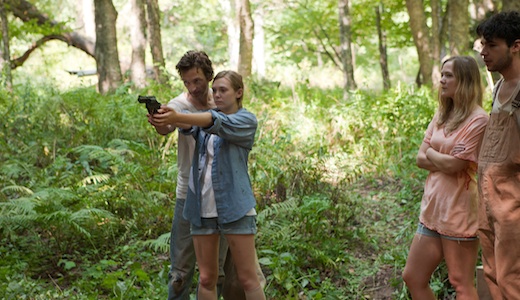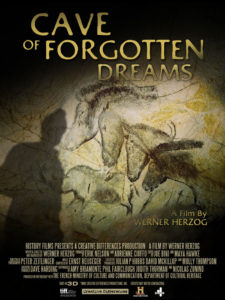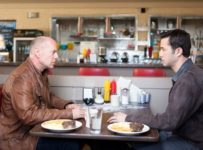 The penultimate day of the 58th Sydney Film Festival began with enthusiasm with lines already out onto the street by 9:00 am for the second screening of Cave of Forgotten Dreams. Indeed, it was a day of sold-out sessions with the highly anticipated Martha Marcy May Marlene and POM Wonderful presents: The Greatest Movie Ever Sold. The twelfth and final competition entry, Australia’s Toomelah was met with mediocre responses from viewers if the #sydfilmfest tweets are to be believed, with the words “bleak”, “flat” being bandied about, and several punters labelling it unemotional. The Festival also took us Armenia with HERE, down a dark Corridor and to the depth of insanity with the The Beaver. – Saturday, June 18, 2011.
The penultimate day of the 58th Sydney Film Festival began with enthusiasm with lines already out onto the street by 9:00 am for the second screening of Cave of Forgotten Dreams. Indeed, it was a day of sold-out sessions with the highly anticipated Martha Marcy May Marlene and POM Wonderful presents: The Greatest Movie Ever Sold. The twelfth and final competition entry, Australia’s Toomelah was met with mediocre responses from viewers if the #sydfilmfest tweets are to be believed, with the words “bleak”, “flat” being bandied about, and several punters labelling it unemotional. The Festival also took us Armenia with HERE, down a dark Corridor and to the depth of insanity with the The Beaver. – Saturday, June 18, 2011.
The always interesting Werner Herzog turns back to the documentary form after fictional features Bad Lieutenant: Port Of Call – New Orleans and the little-seen My Son, My Son, What Have Ye Done. In 1994, the Chauvet-Pont-d’Arc Cave was discovered in southern France, significant for having some of the earliest cave paintings in human history, and being in magnificently preserved. Herzog goes inside the caves, along with a small group of scientists and historians he interviews, to discover their meaning. Actually finding a decent use for the 3D format for the first time in – let’s be honest – the history of the technology, Herzog and his small crew make the most of their limited access to the cave system. Herzog’s soothing narration can occasionally grate, and in typical Herzog fashion searches for meaning where there may be none. In a possible callback to his Bad Lieutenant closing line (“Do fish have dreams?”), Herzog takes a massive aside during the postscript to examine some albino crocodiles that are the result of nearby nuclear power plants. He ponders what they would make of the cave painting, then goes one step further in asking “Are we the crocodiles staring back into an abyss of time?”. Maybe we are, Werner. Maybe we are.
[stextbox id=”custom” caption=”The Reel Bits”]A fascinating and innovative documentary about a forgotten piece of human history, occasionally derailed by a lack of direction. Either way, Herzog’s aim is to open the audience to questions and Cave of Forgotten Dreams accomplishes this with expert delivery. [/stextbox]
Cave Of Forgotten Dreams opens in Australian cinemas in August, 2011.
Advanced buzz is often a killer of ‘little films that could’, and the 2011 Sundance and Cannes Film Festivals certainly generated enough of it for Sean Durkin’s difficult-to-say Martha Marcy May Marlene. The dual narrative concerns Martha (relative newcomer Elizabeth Olsen), recent escapee from an alternative-living cult run by the manipulative Patrick (John Hawkes, Winter’s Bone) and her tentative steps back into ‘reality’ with her sister Lucy (Sarah Paulson) and obnoxious spouse Ted (Hugh Dancy). The parallel story-lines result in a fractured world for Martha, known in her other life as Marcy May and Marlene. Durkin’s slow-moving script aims for contemplative, punctuated by moments of horror in which her past life penetrates her current, and Martha’s unravelling and inability to cope with life outside the cult compound demonstrate some undoubtedly decent acting chops on Olsen. Yet Martha Marcy May Marlene is also a cold film, keeping the audience at arm’s length with a pair of irredeemably unlikeable characters in Lucy and Ted, and a script that refuses to commit to anything all the way up to its ambiguous ending. Durkin has a half-decent film on his hands here, and it will be even better if he ever sees fit to finish it.
[stextbox id=”custom” caption=”The Reel Bits”]Despite a noticeable performance by Olsen, Martha Marcy May Marlene is an often directionless and lazily plotted film with some wholly unlikeable characters.[/stextbox]
The Sydney Film Festival continues until June 19, 2011.
For more news and reviews from the Sydney Film Festival, check out our coverage of previous days of the 2011 event:







No Responses